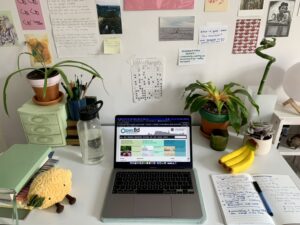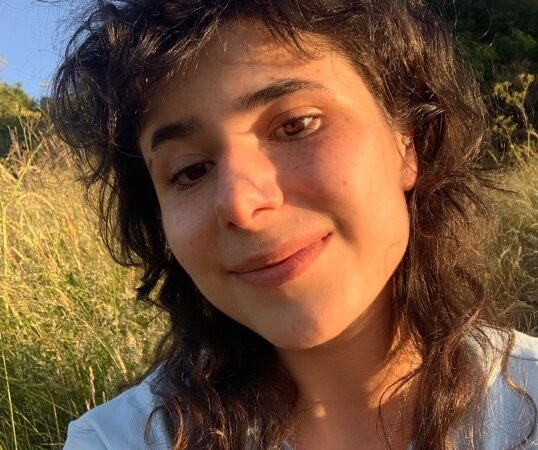Programme of Study and Year: MA Fine Art, Year 4
Hobbies: Weightlifting, reading (fiction, poetry, now cyberfeminism?), visiting galleries. Plant Mum™️
Intern Position: Open Content Curator
Known for at the office: My fun earrings [devastatingly not pictured] and alarmingly good sourdough
Describe your role in 4 words: Adapting, negotiating.. copyright legislation?!
Beginning the internship
I am (un?)fortunately someone who constantly checks their email. So, when the variety of summer internships slid into my inbox, the Open Content Curatorial role caught my eye. I was fascinated because I already had an interest in the Open Education movement, and its connections to the broader openness movement and freedom of information.
My role involves adapting different resources produced by different groups to an openly licensed, accessible resource that can be re-used and distributed to anyone who wants to access it. It has involved a lot of copyright legislation! At the moment, we’re working with SatSchool, a group of Earth Observation PhD students to adapt their resources to ones which can be accessed by a variety of schools and education systems. We’re also working with the Geoscience Outreach Projects to develop resources which can be distributed in schools. These are called Open Education Resources (OERs). They can be adapted to suit your needs and come in various formats and subjects. They are free, non-commercial resources which can be downloaded, used, and redistributed.
I love research, so uncovering layers of the resources and adapting them to be openly licensed means I also get to see what else the group has been working on. People citing their own paper will never not be a power move. The role comes with a lot of digital skills training, on various topics from Equality, Diversity and Inclusion (EDI) in data and tech, to LinkedIn learning, to coding! Even when you think you know a bit about a subject, a different perspective will always teach you something new, so I’ve been learning a lot. I’ve also really enjoyed working with Alyssa and listening to her advice. Being able to collaborate and feedback thoughts has helped us both develop our ideas.

Progressing the internship: How OERs can help with accessibility and intersectional digital spaces.
I’m very excited because Charlie (our manager) has given us the chance to start thinking about our own OERs we might like to develop, and I want to produce something for disability pride month in July. I have a strong idea of the format I’d like this to take, and the themes of diversity and acceptance I want to develop.
This has coincided with a virtual talk run by Vicki Madden and Lilinaz Rouhani on EDI in Tech, examining specifically how careers in Tech are gendered and the impact this has on the digital world that is subsequently created. I was really interested in the cyberfeminist articles and resources they recommended, and I will definitely be attending their ISG book group! Digital spaces reinscribe the physical, societal space, so this manifests as easily as disproportionate information on Wikipedia and the invisible women. In particular, this means that when these power structures are replicated in a digital world, marginalised individuals are the most affected, including black and indigenous, queer and disabled women and nonbinary individuals.
There are some efforts to counter this, such as the Wikimedia ‘Women in Red’ project. I joined this month’s editathon, which similarly adds hidden biographies of LGBTQ+, black and indigenous people of colour and women to Wikipedia. This editathon was probably one of the most enjoyable events I have attended during my internship so far, because it also touched on my own personal frustrations. I’m really interested in women in hip-hop and rap (everyone read Flip the Script by Arusha Qureshi) and specifically the intersection of queer identity with this. However, when I came to make a playlist specific to this, I began researching artists and could only find different sources through interviews and blogs outside of Wikipedia. None of these artists existed in this digital space, and it was so fun compiling sources and creating pages to change this.
I wanted to think beyond this, of my own way that I could help address these spaces and create spaces for marginalised identities through OpenEd. Accessibility has always been important for me, not always necessarily by choice, but because it’s something I have to think about every day. The people who are shaping these digital spaces are important because they carry these narratives and ideas to the table to include them. As much of our learning and education shifts to hybrid and digital spaces (a positive move for many disabled individuals) it’s important to carry forward these considerations of other intersecting identities. OERs feel like they can contribute to making these spaces and making these changes. By foregrounding information and data that is openly licensed (‘copy left’), they remove the barriers and blocks which exist elsewhere in education to create a hopeful possibility for the future and future learning.


